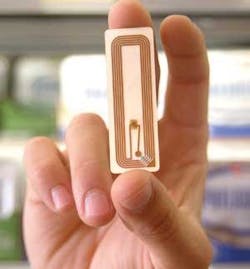By Ben Ames
SUNNYVALE, Calif. - Pentagon leaders in July and August have issued a flurry of contracts for radio-frequency-identification (RFID) tags and technology.
They are scurrying to keep up with a July 2004 requirement that every Defense Department supplier attach RFID tags to every item by 2007. The order was in a memo from Michael Wynne, the acting undersecretary of defense for acquisition, technology, and logistics.
RFID tags are thin antennas as small as a postage stamp, used to mark shipping containers and pallets so logistics workers can track their movements throughout the supply chain. Some tags hold only a serial number, while others can store an entire cargo manifest.
Active RFID tags have batteries so they boast more read-write range and data-content bandwidth than passive tags; they are expensive but short-lived. Passive tags last longer than active tags because they are only powered up when an RFID reader is reading them.
Commercial retailers like Wal-Mart and Gillette have been tagging their products for years, preparing for a day when supermarket shelves can read those tags and automatically order replacements when supplies get low. The system works technically, but economically the tags are still too expensive-companies say its only profitable to use them on entire pallets and containers, not individual items.
U.S. Department of Defense (DOD) planners have used active tags only on 40-foot shipping containers or large items like trucks and helicopters. Now the DOD is looking to increase the use of passive tags, which tend to be applied at the pallet or box level. For more information, see the DOD Logistics Automatic Identification Technology office, www.dodait.com.
The switch to passive tags could affect the entire market, since the military logistics sector is so large that it will allow RFID providers to make cheaper hardware. The change will come soon.
In August, Savi Technology in Sunnyvale, Calif., won a DOD purchase agreement from the U.S. Army Contracting Agency (ACA)’s Information Technology, E-Commerce, and Commercial Contracting Center (ITEC4) in Alexandria, Va. For more information, see www.itec4.army.mil or http://aca.saalt.army.mil.
Savi will provide technical engineering services and integration software for all military branches trying to meet EPC-passive RFID tag policy requirements. EPC is the Electronic Product Code, an industry standard for RFID electronics technology. The company will team with systems integrator RFID Global Solution (RFIDGS), Fayetteville, Ark.
Savi says its software and hardware products have been the foundation of the DOD’s RF-Intransit Visibility (RF-ITV) network, the world’s largest active RFID consignment visibility system, tracking an average of 35,000 shipments daily through more than 1,500 locations in 46 counties.
Pentagon planners are awarding contracts for RFID tags and readers as they strive to meet a deadline for marking every item.
“We are an RFID and software-solution provider with many proven examples of implementing successful RFID-based systems in global networks for the DOD, NATO, the United Kingdom Ministry of Defence, and other allied defense organizations,” says David Stephens, Savi’s senior vice president for the public sector. “We have over nine years experience in passive RFID implementations and have been actively involved in the development of EPC standards. We’re pleased to be teamed up with RFID Global Solutions to leverage their technical integration expertise for implementing EPC based passive projects.”
In a July deal, Intermec Technologies Corp. in Everett, Wash., won a contract to provide passive RFID technical engineering services to support the DOD and Coast Guard.
Earlier this year Intermec was granted blanket purchasing agreements (BPAs) to provide RFID tags and readers. They are not alone. About 20 companies have earned RFID-related blanket purchasing agreements with the government, which essentially means they are approved to bid on government contracts, according to Intermec Director Larry Huseby.
Intermec also is prime contractor on a five-year contract to provide an entire range of automatic identification technologies. That contract, administered by the U.S. Army, supplies a complete line of advanced mobile computing, wireless communications, data collection systems and services to all federal agencies and branches of the DOD worldwide.
In May, ADT Security Services Inc. of Boca Raton, Fla., won a blanket purchase agreement from the DOD for the sale of fixed and portable RFID readers and antennas.
The agreement runs through June 2007 and is part of the department’s effort to standardize RFID technology pricing and compatibility for all its branches, as it moves forward with its initiative to use RFID for logistics identification, tracking, locating and monitoring of commodities and assets.

